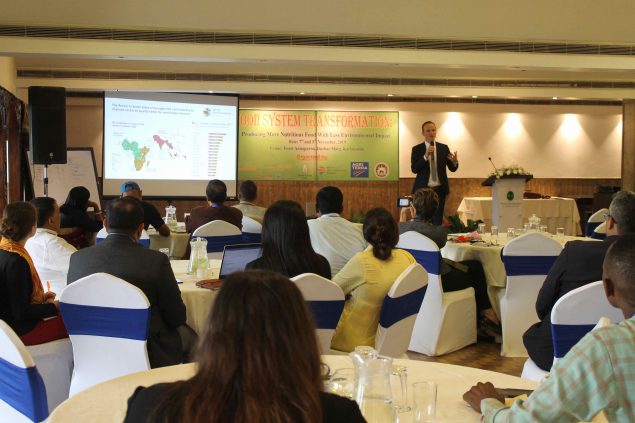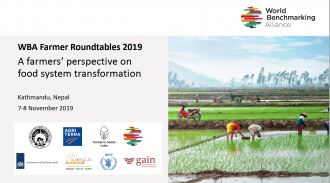
Change agent with a 30 year trackrecord of promoting sustainability and diversity. As a pioneer in SDG benchmarking I set up the Access to Seeds Index, which evolved into the World Benchmarking Alliance
Speaker Bio & Photo
Contact

On 7 and 8 November 2019, WBA organized a Farmer Roundtable in Kathmandu, Nepal to discuss with farmers and companies from South and Southeast Asia how they can collaborate on food system transformation. This is the concluding statement:
This week bought together over 1200 delegates and 70 nationalities from governments, academia, civil society, private sector and others to Kathmandu for the SUN Global Gathering. This flagship event, titled “Nourishing people and planet together”, gave members and stakeholders the opportunity to take stock, share innovations and map progress on the fight against malnutrition worldwide.
The World Benchmarking Alliance, along with our local partners Agriterra and NACCFL, were extremely proud to hold our own event alongside the gathering, focusing on the broad issue of food system transformation – producing more, and more nutritious, food while reducing environmental impact and enhancing rural prosperity for farmers and their communities.
Our farmers roundtable bought together 14 farmers from six different countries (Nepal, the Philippines, Vietnam, Indonesia, India and Bangladesh) to give their perspective on this global agenda and the challenges they face. Leading problems include the overuse of fertilizers and pesticides and their impact on farmers, consumers and the environment; water scarcity and poor water management; trade offs between yields and productivity when cultivating more nutritious food; declining youth interest and participation in agriculture; and access to a higher variety of quality seeds and other agricultural inputs.
The farmers concluded that they need a number of actions from the private (and public) sector in order for them to contribute to the change we need. To produce more nutritious food, companies need to offer those who produce it a fair price and better access to markers, in addition to marketing these foods more effectively to consumers. Similarly, to reduce their environmental impact farmers need eco-friendly inputs, suitable and affordable machinery, and more training on good agricultural practices. Crucially, food system transformation can only be achieved when farming is presented as a viable and attractive livelihood opportunity, particularly for young people. Respect for the farmer and greater cooperation between farmer cooperatives and the private sector is key to this.
The second day of our event saw our 14 farmers joined by representatives from the SUN Business Network, multinational companies and regional and global small and medium sized enterprises (SMEs), to discuss how they can work together to tackle the challenges and issues raised on day 1. The most popular solutions included greater need for female empowerment and gender equality through capacity building – not just practical training but also soft skills to allow them to negotiate with buyers, with the need for education and training again linked to overall greater respect for farmers. Nutrtionally, improved technology to avoid nutrient loss during processing and greater availability of biofortified seed were highlighted. Environmentally, the most important answers were more R&D for climate resilient seed varieties, integrated agriculture and livestock farming to improve the circularity of the ecosystem, and increased usage of alternative sources of energy.
The outcomes of this event will be invaluable for the development of WBA’s methologies and benchmarks in food and agriculture. We would like to thank all of the farmers, partners, businesses, civil society and other stakeholders for attending this very successful event and we hope to see you again in the future.
